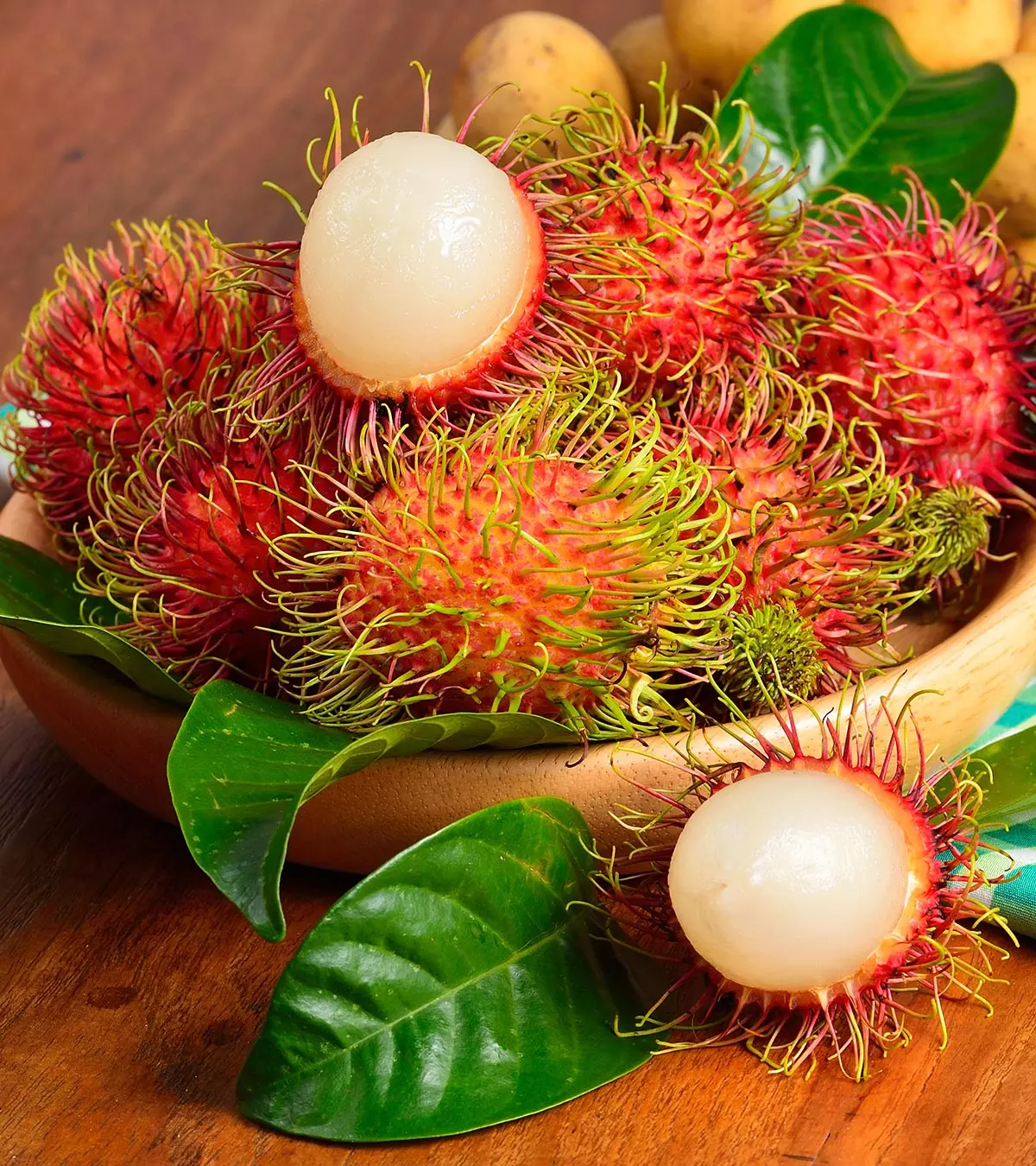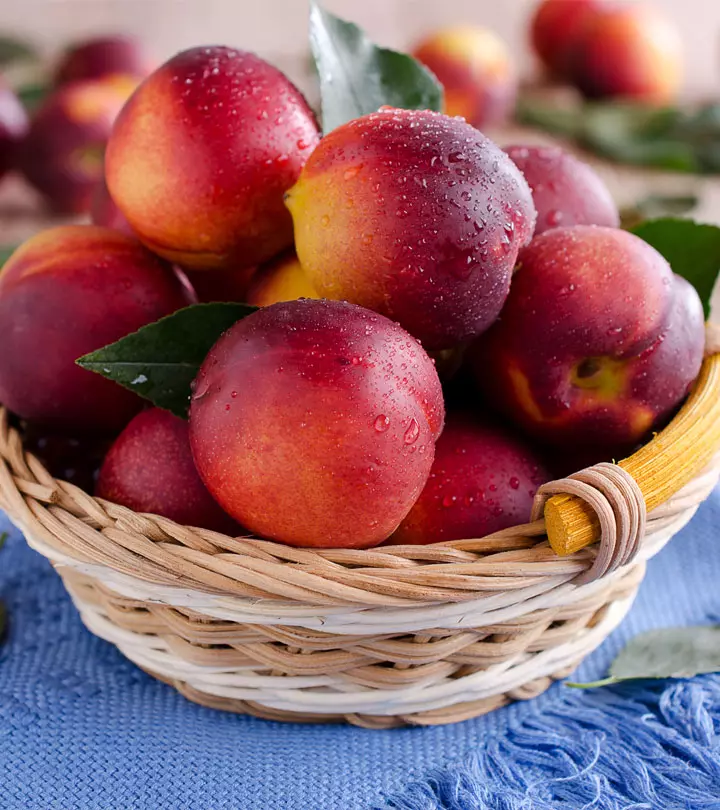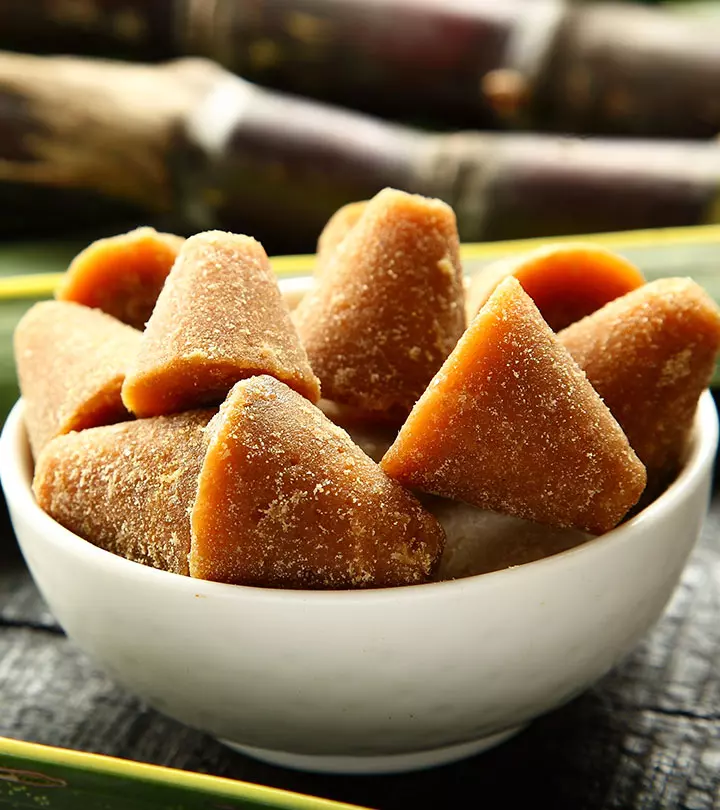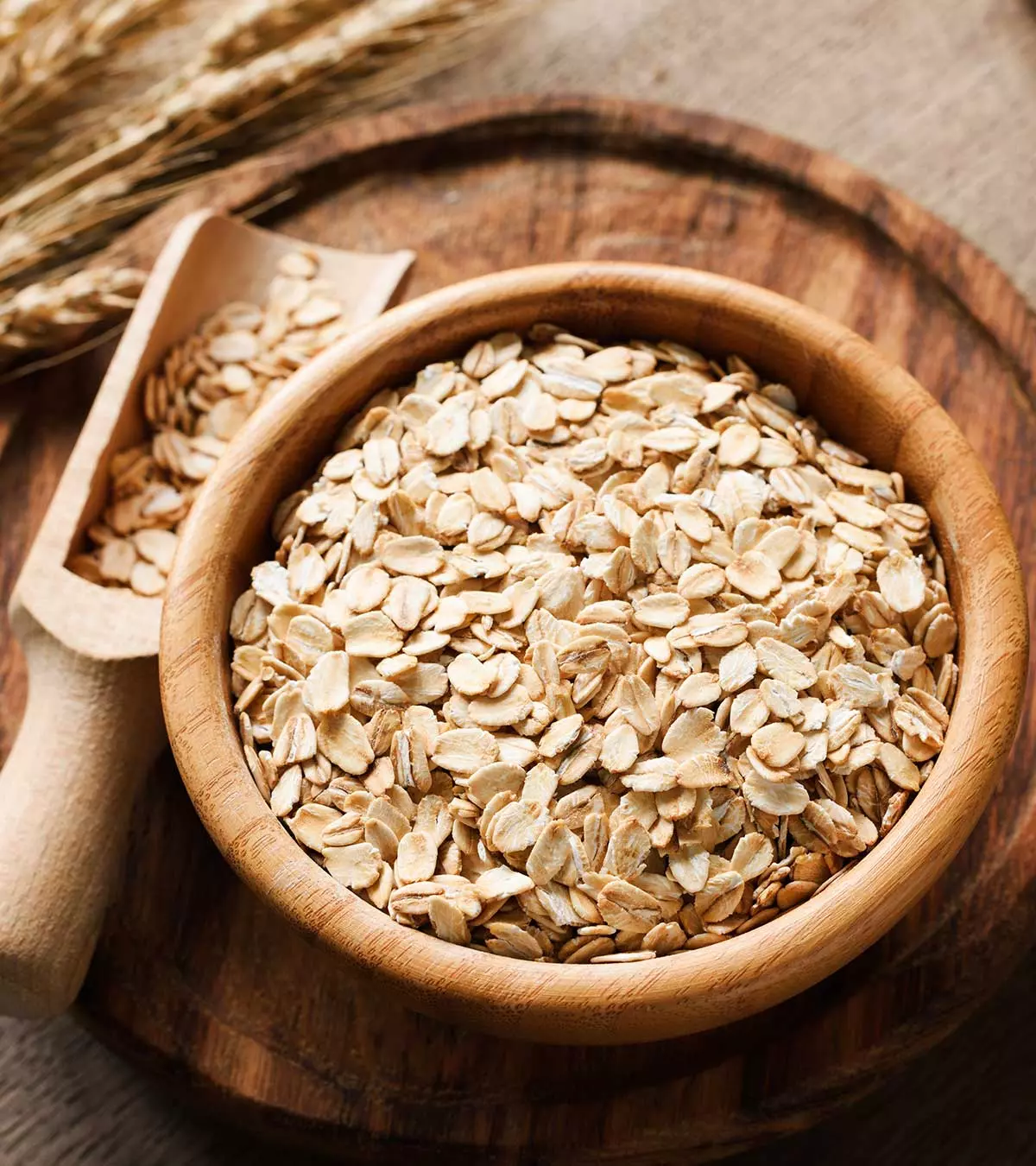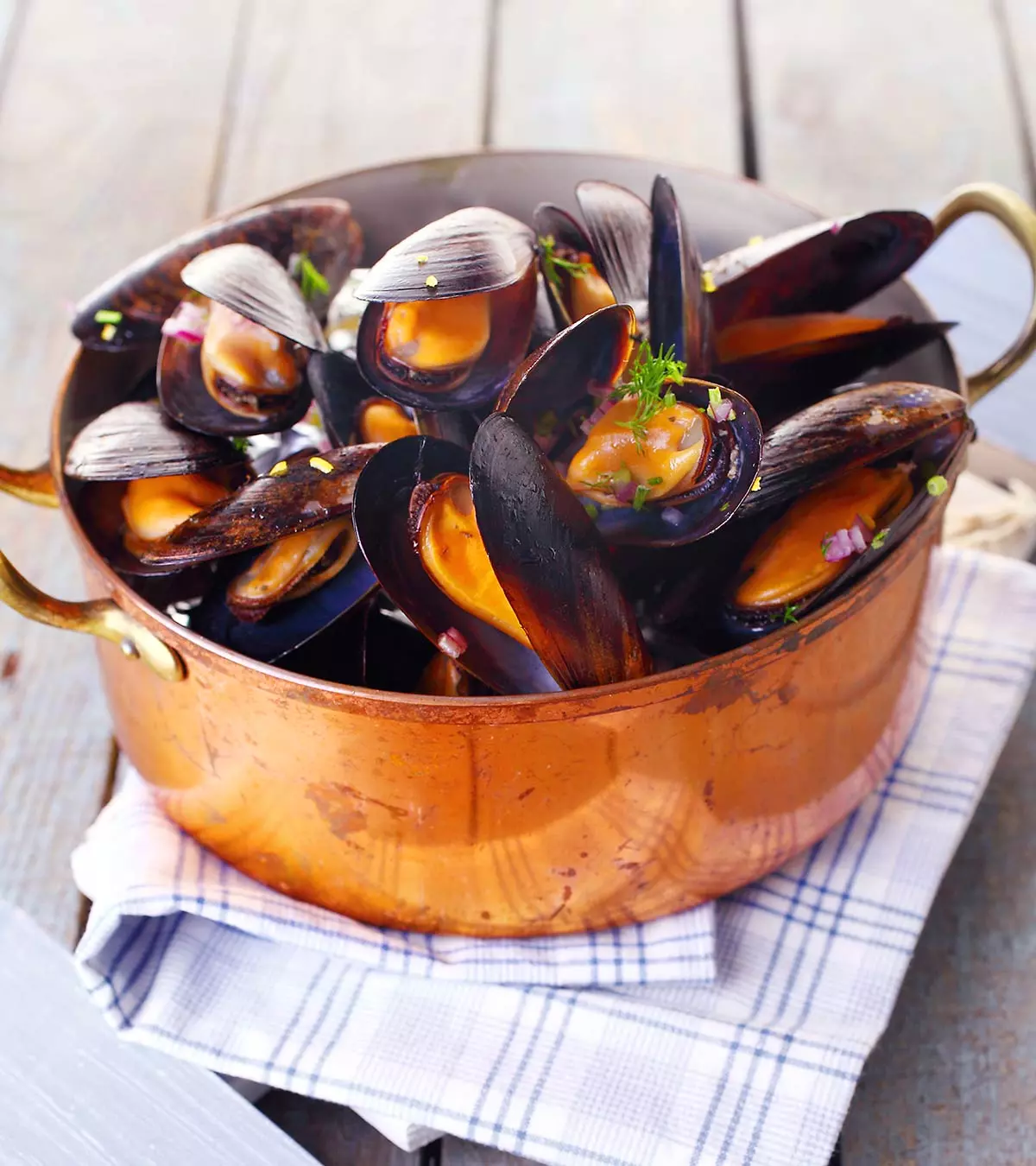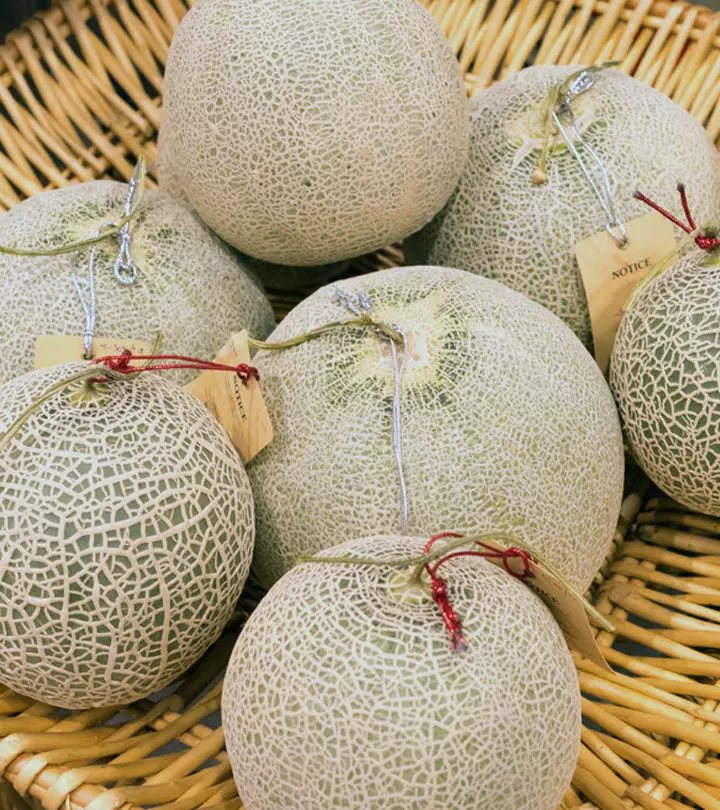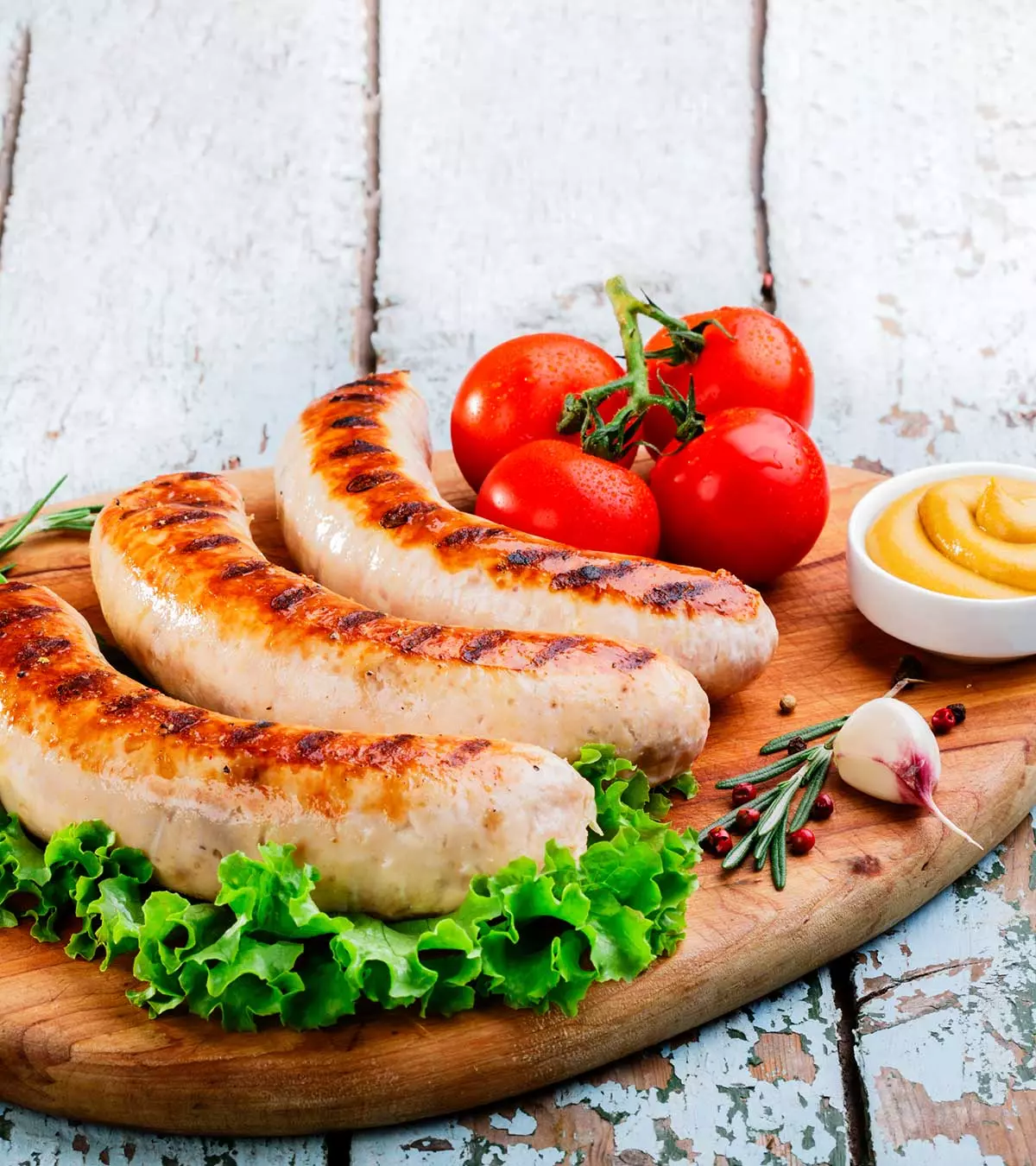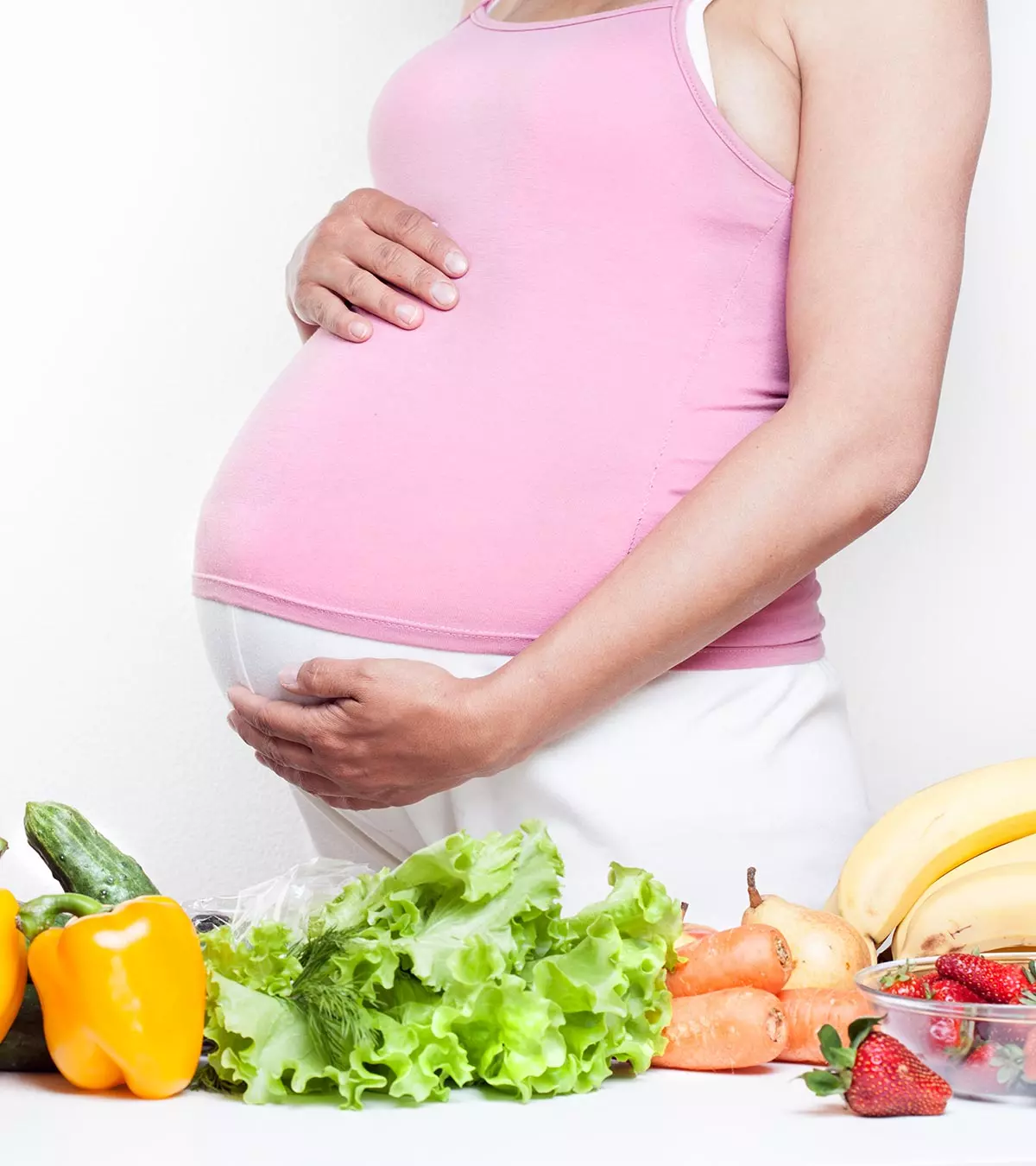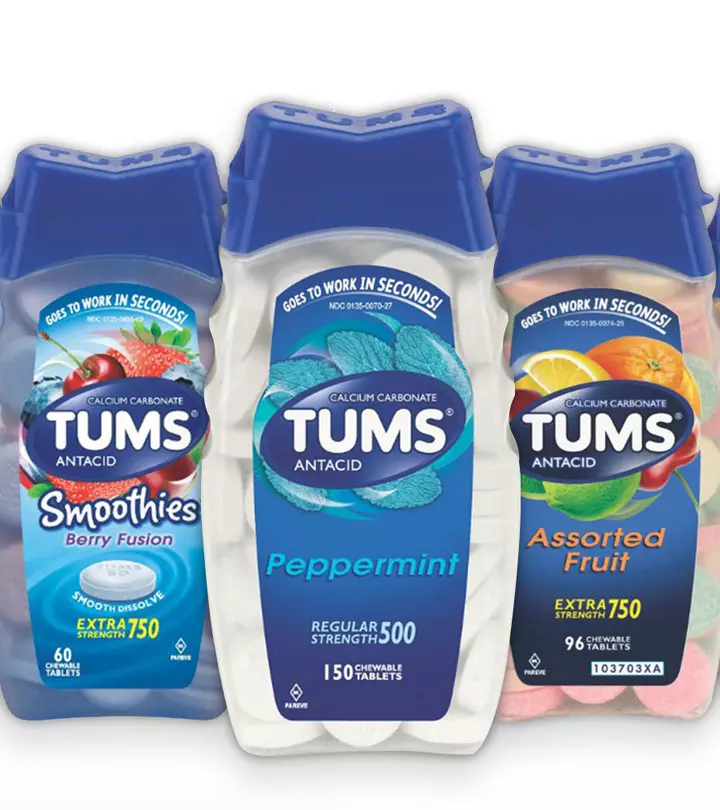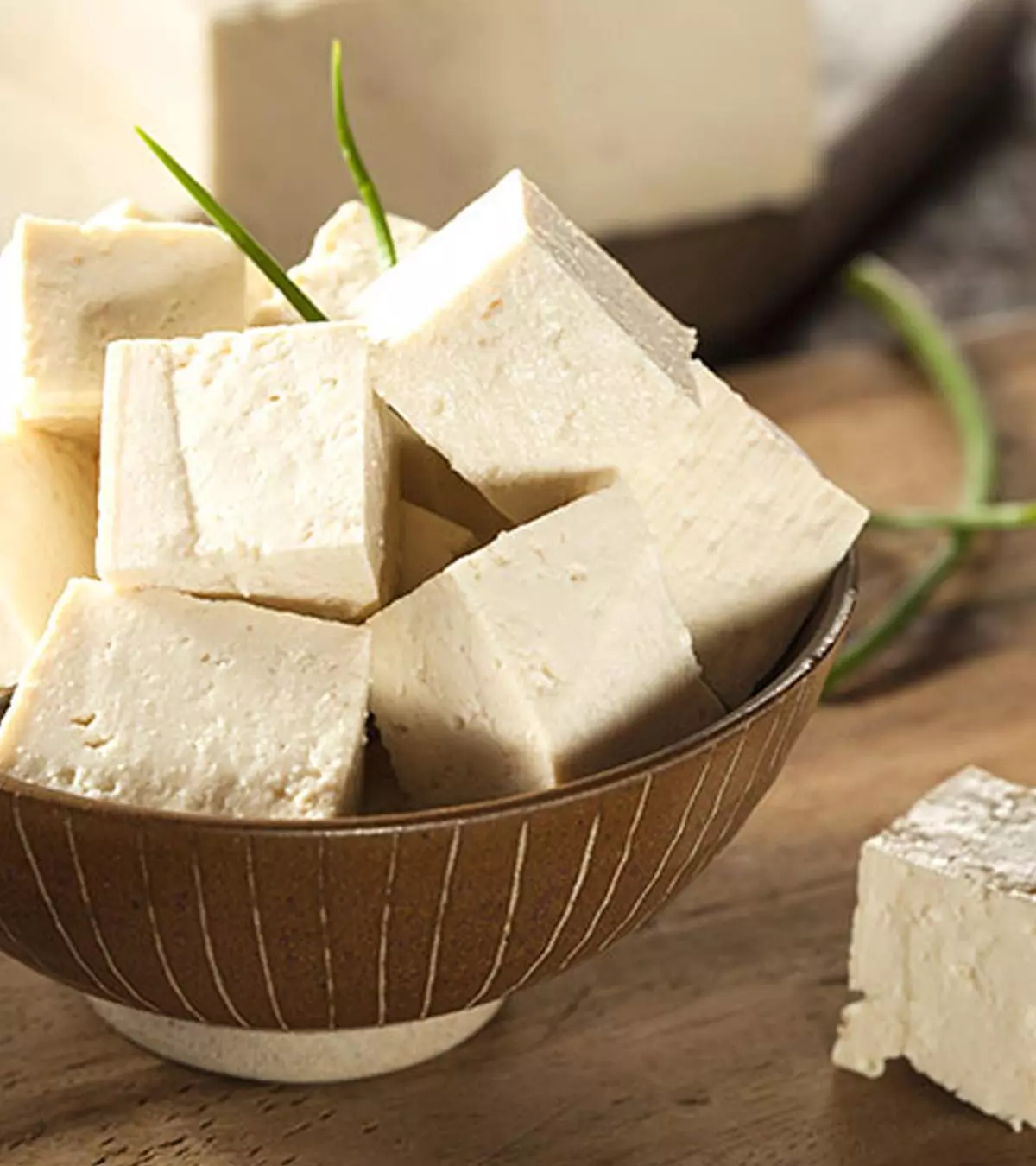
Image: ShutterStock
Paneer or cottage cheese is a popular soft cheese made by curdling heated milk with lemon juice, vinegar, or curd. It’s one of the most common ingredients in dishes that you may crave when pregnant (1). But can you eat paneer during pregnancy? Knowing this is essential as milk products made with unpasteurized milk can cause foodborne infectionsiInfections caused due to consumption of food contaminated with harmful microbes or toxins .

Read on as we tell you more about the safety of paneer for pregnant women, how it differs from cheese, its maternal health benefits, and some pregnancy-friendly paneer recipes you can try at home.
Key Pointers
- Paneer or cottage cheese is a fresh, soft cheese made from curdled milk that is rich in protein, calcium, and vitamins.
- Including paneer in a pregnancy diet can aid in bone development, fetal muscular growth, and provide adequate calories to pregnant women.
- However, excessive or stale paneer, made from unpasteurized milk, may cause digestive issues, weight gain, and excessive sodium intake during pregnancy.
- Hence, it is advised to consume paneer that is well-cooked at home and served hot to avoid the risk of foodborne illnesses.
- To reduce any side effects of store-bought paneer, it is important to ensure its freshness, pasteurization, proper cooking, and avoid refrigeration beyond a week.
Difference Between Cheese And Paneer
| Comparatives | Cheese | Paneer |
|---|---|---|
| What are they | It is a dairy food made of ripened or compressed milk separated from they whey. It is one of the milk products obtained through acidification. | It is a fresh cheese made by churning milk using some acids through a process of acidification. Souring agent is used to coagulate the milk protein while it is fresh. |
| How are they made | Milk is coagulated at room temperature by using yogurt (along with rennet) and a live culture. The live culture turns lactose to lactic acid thereby altering the milk’s pH, whereas the rennetiSet of enzymes that play a role in the process of coagulation of milk coagulates the milk to turn it into cheese (2). | Milk is boiled to 200°F. Some acids are added to the milk for coagulation. Then lemon juice or vinegar is added to the coagulated milk to turn into paneer (3). |
| Usage | Can be eaten raw; used in cooking; top cheeses include white cheese, cream cheese, American cheese, brie. | Used as a side dish or to make a curry. |
| Calories per ounce | High caloric food (105) | Low caloric food (80) |
Paneer is quite simple and easy to cook. Moreover, it has fewer calories than cheese.
Is Paneer Safe During Pregnancy?
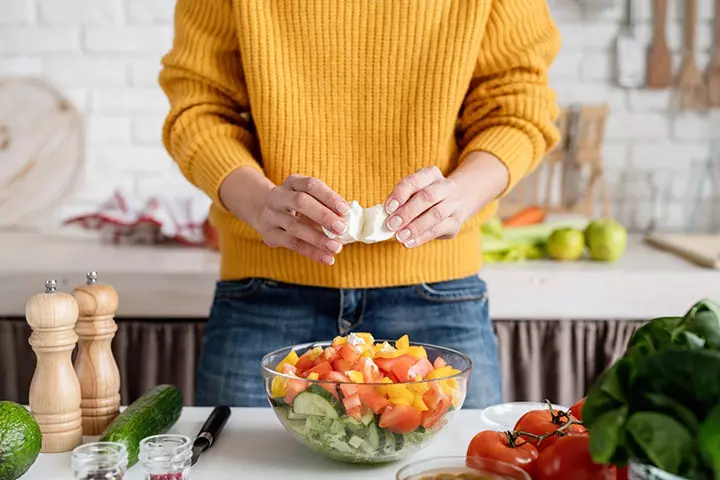
Yes, paneer made from pasteurized milk is safe to eat during pregnancy. But, you must have it in moderate amounts. Also, you need to be careful if you are lactose intolerantiA person who cannot digest lactose, a sugar component found in dairy products, due to lack of lactase enzyme . Paneer is a rich source of calcium, and including it in your pregnancy diet adds to your daily recommended intake of calcium.
 Point to consider
Point to considerHow Paneer Can Help During Pregnancy
Here is how the nutrients in paneer can be useful in your pregnancy:
1. Calcium
Paneer contains calcium and phosphorus which are essential for the development of bones and teeth and overall fetal growth. It also helps in preventing the demineralizationiLoss of minerals ions from bones resulting in reduced bone integrity of bones in pregnant women.
2. Protein
Protein is essential for proper fetal development, especially for the growth of the tissues and muscles of your unborn baby (4).
3. Calories
Around 100g of paneer provides 265 kcal of energy, thus adding to your daily calorific count.
4. Omega-3s
Paneer contains omega-3 fatty acids that are essential for your body.
Even as it has some uses, paneer comes with some side effects too if you are over-consuming it or eating a stale or poor quality panner.
Side Effects Of Overeating Paneer During Pregnancy

Any food can cause side effects if taken in excess. Paneer also has certain harmful effects if you over-consume it.
- Excess consumption can cause digestive issues.
- The excess sodium in paneer can add to your daily intake of sodium and might increase the levels.
- Leads to weight gain.
Eat paneer in the recommended quantities and follow certain precautions, so that you can make the most of this cheese during pregnancy.
Precautions When You Eat Paneer During Pregnancy

Follow these measures when you add paneer to your pregnancy diet:
- Make sure the paneer you choose is made from pasteurized milk.
- Before you buy paneer, check the labels for freshness and ensure that it is made with high-quality ingredients.
- Do not refrigerate beyond one week. Eat it fresh.
- Do not buy the variety that is discolored, cracked, or dried.
- Always make sure to check with your OBS/GYN before including paneer in your diet.
The next section tells you how you can consume paneer.
 Quick tip
Quick tipCan You Eat Raw Paneer During Pregnancy?
Do not eat raw or uncooked paneer during pregnancy even if it were made from pasteurized milk
. Always cook it before you eat to remove any harmful bacteria present in it.
The safest paneer to eat is the one that is made at home.
How To Make Paneer At Home?
Here is how you can make paneer at home:
You will need:
- Milk
- Souring agent (lemon or vinegar)
How to:
- Boil milk over medium to high flame.
- Add one to two teaspoons of the souring agent diluted with some water and stir the mixture.
- Wait until it coagulates (you will see paneer and water separating). Leave it for a while until it settles.
- Transfer the content into a muslin cloth and leave aside until the water is strained completely.
- The fresh and homemade paneer is ready for making a dish of your choice.
- Now that the paneer is ready, let’s take a look at a few dishes you can make with it.
 Quick tip
Quick tipEasy Pregnancy-Friendly Paneer Recipes
1. Palak paneer
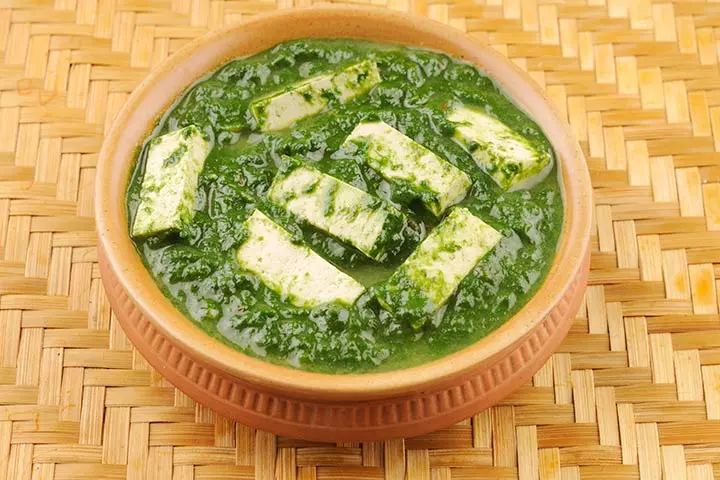
You will need:
- 150g paneer cubes
- 100g palak
- 2-3 green chilies, deseeded
- ¾ cup onions, finely chopped or paste
- ½ cup tomatoes, deseeded and pureed
- ¼tsp kasuri methi
- ¼tsp cumin powder
- ½tsp coriander powder
- 1tsp ginger garlic paste
- A pinch of garam masala
- 1in cinnamon stick
- 2 cloves
- 2 green cardamoms
- A pinch of cumin seeds
- 10 cashews/ 2 to 4tbsp fresh cream
- Oil or butter as required
- Salt as required
How to:
- Fry paneer in a non-stick pan with one tablespoon of oil over medium flame. Fry them shallow until their sides turn light brown. Transfer them to a plate, or drop them in water to keep them soft. Leave for 10 minutes, drain, and set aside.
- In the same pan, add spinach, green chilies, and fry for about two to three minutes over a medium flame. Let the spinach wilt off completely and keep it aside to cool. Make a smooth puree of spinach and green chilies.
- Heat oil in a pan and add cinnamon cloves, cardamom, and cumin. Once they start to splutter, add onions and fry until they become golden.
- Add ginger garlic paste and fry until the raw aroma goes away.
- Add tomatoes and salt, and fry until they become soft.
- Now add coriander powder, cumin powder, kasuri methi, and garam masala. Sauté them thoroughly.
- Add half a cup of water and stir continuously until the mixture develops a thick consistency.
- Simmer on a low flame and add spinach puree. Cook for a while until you see bubbles forming up.
- Add fried paneer and stir.
- If you are using cream, you can add it now. You may also use cashews as a substitute. Soak them in warm water for about 10 to 15 minutes and blend for a milky, cream consistency.
- You can eat palak paneer with rice, roti or naan.
Preparation time:
35min
Servings: 3
2. Paneer tikka
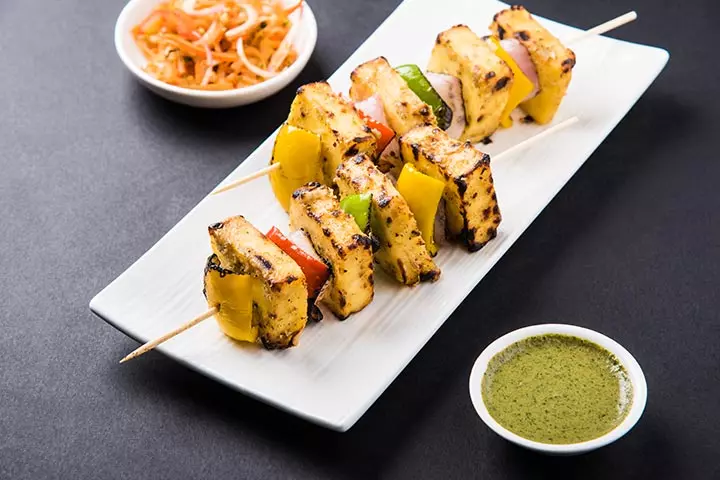
You will need:
- 250g paneer, square-shaped cubes
- 3 bell peppers – one each of green, red and yellow, chopped into square shape
- 1 onion, medium size
- 200g Hung curd or Greek yogurt
- 1tbsp ginger garlic paste
- 1tsp carom seeds
- 1 to 2tsp Kashmiri red chili powder
- 1tsp cumin powder
- ½tsp turmeric powder
- ½tsp garam masala
- 1tsp coriander powder
- 1tsp chat masala
- 1tsp dry mango powder
- ½tsp black pepper powder
- ½tbsp lemon juice
- ½tsp black salt
- 1tbsp oil
- Salt as required
How to:
- Take curd in a large bowl and whisk it until it turns smooth.
- Add ginger garlic paste, all the above spice powders, carom seeds, and black salt.
- You can also add some oil and mix all of them thoroughly.
- Now add paneer cubes and chopped veggies to the marinade.
- Marinate for two hours, or you can also refrigerate it.
- Bring the marinated paneer to room temperature.
- Arrange them on skewers or wooden toothpicks.
- Heat non-stick tawa or griddle, apply oil on it.
- Once the tawa is hot, arrange the skewers, and shallow fry them over medium heat.
- Rotate the skewers so that all the sides of paneer and veggies turn light brown. Each side takes about three to four minutes.
- Transfer to a serving plate, and sprinkle some lemon juice and chat masala on them.
- You can eat it with mint chutney and sliced onions.
3. Paneer veggie wrap
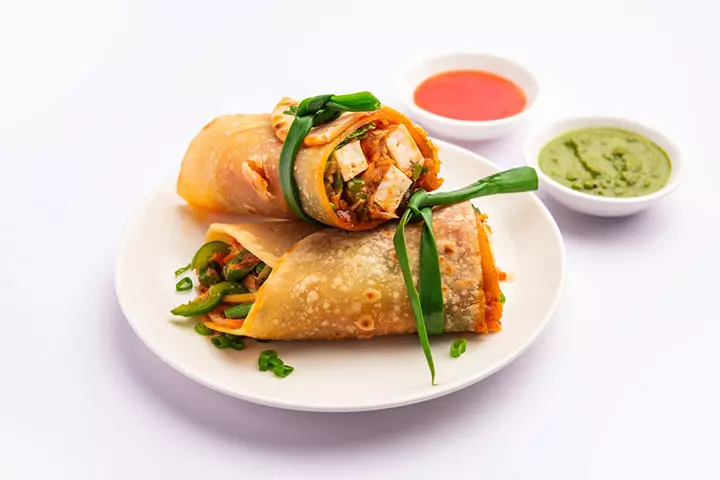
You will need:
- 200g paneer, cubed
- 1 cup mixed colorful bell peppers, thinly sliced
- 1/2 cup grated carrots
- 1/2 cup thinly sliced cucumber
- 1/4 cup chopped spinach
- 2tbsp olive oil
- 1tsp cumin powder
- 1/2tsp turmeric powder
- Salt and pepper to taste
- Whole wheat tortillas
How to:
- In a pan, heat one tablespoon of olive oil. Sauté paneer until lightly brown; season it with cumin, turmeric, salt, and pepper; set aside.
- In the same pan, soften bell peppers and add spinach, carrots, and cucumber.
- Set tortillas, place sauteed paneer, and veggies.
- Roll tightly and toast briefly in a skillet.
Slice in half to serve.
In addition to the above-mentioned recipes, there’s a simpler way to incorporate the goodness of paneer into your daily meals. Take a cue from Itto, a mother of five who enjoyed this during her pregnancy. She shares, “My favorite breakfast these days (33 weeks pregnant): homemade paneer (made of fresh cow milk) sautéed in olive oil with a bit of salt and curry, half of a green apple seared with cinnamon, and a fresh tomato from the garden (i).” This quick and delightful sautéed paneer dish can be a perfect addition to your pregnancy diet, especially on busy days.
Frequently Asked Questions
1. Can I eat paneer every day during pregnancy?
Paneer has many essential nutrients, like calcium, that can benefit pregnant women. However, it may also cause weight gain or digestive problems (1). Moreover, if you are lactose intolerant, you could react. Hence, you should eat paneer in small quantities if you have it daily.
2. How much paneer can a pregnant woman eat?
In general, 50-100 gms of paneer is considered to be appropriate for a pregnant woman. However, there is no scientific backing to this. You may consult your doctor or a nutritionist to know how much paneer you can eat when pregnant.
3. Can eating paneer during pregnancy improve my baby’s skin?
There is no evidence that eating paneer during pregnancy improves a baby’s skin. However, it is known that eating healthy foods during pregnancy will enhance the fetal health (5).
4. Can I eat paneer butter masala during pregnancy?
Australia-based registered dietitian and nutritionist Vivian Yu recommends, “Eating paneer butter masala during pregnancy is acceptable in moderation. However, be cautious of the creamy and rich gravy as it is high in calories and fat. Also, consume the dish with fewer spices, as spices can cause heartburn, which is common during pregnancy.”
Having paneer during pregnancy is considered a healthy vegetarian choice as it is a rich source of calcium and omega-three fatty acids that helps in the baby’s development. But if you are lactose intolerant, you should consult your doctor about its substitutes and how you should consume them. Before adding paneer to your diet, ensure it is freshly made from pasteurized milk and avoid consuming it in its raw form. The paneer recipes that we have provided will come in handy for you, and you will find them tasteful.
Infographic: How To Prepare Paneer At Home?
Paneer is nutritious and safe to eat when pregnant. However, since paneer is made from unpasteurizediFood items that are not pasteurized (treated with high temperatures) and, when consumed, may cause diseases milk and might have listeria contamination that could harm the pregnancy, it is better to make paneer at home. Check out the infographic below to learn a homemade paneer recipe with simple ingredients.
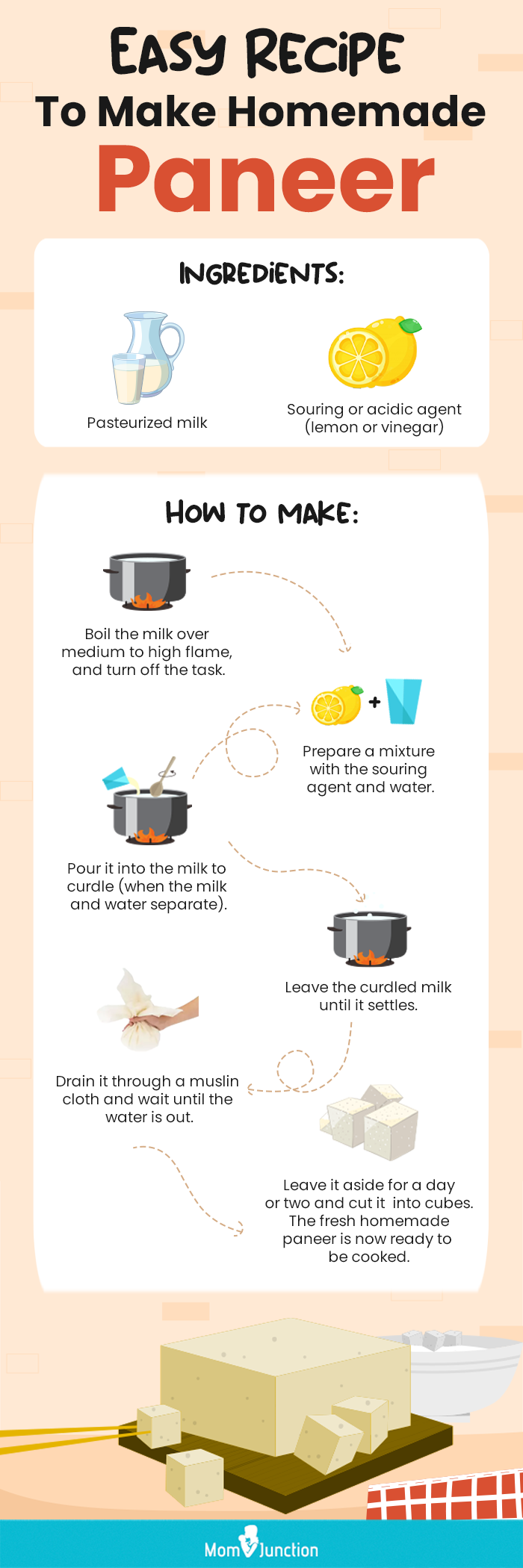
Illustration: Momjunction Design Team
Illustration: Paneer During Pregnancy: Benefits And Side Effects
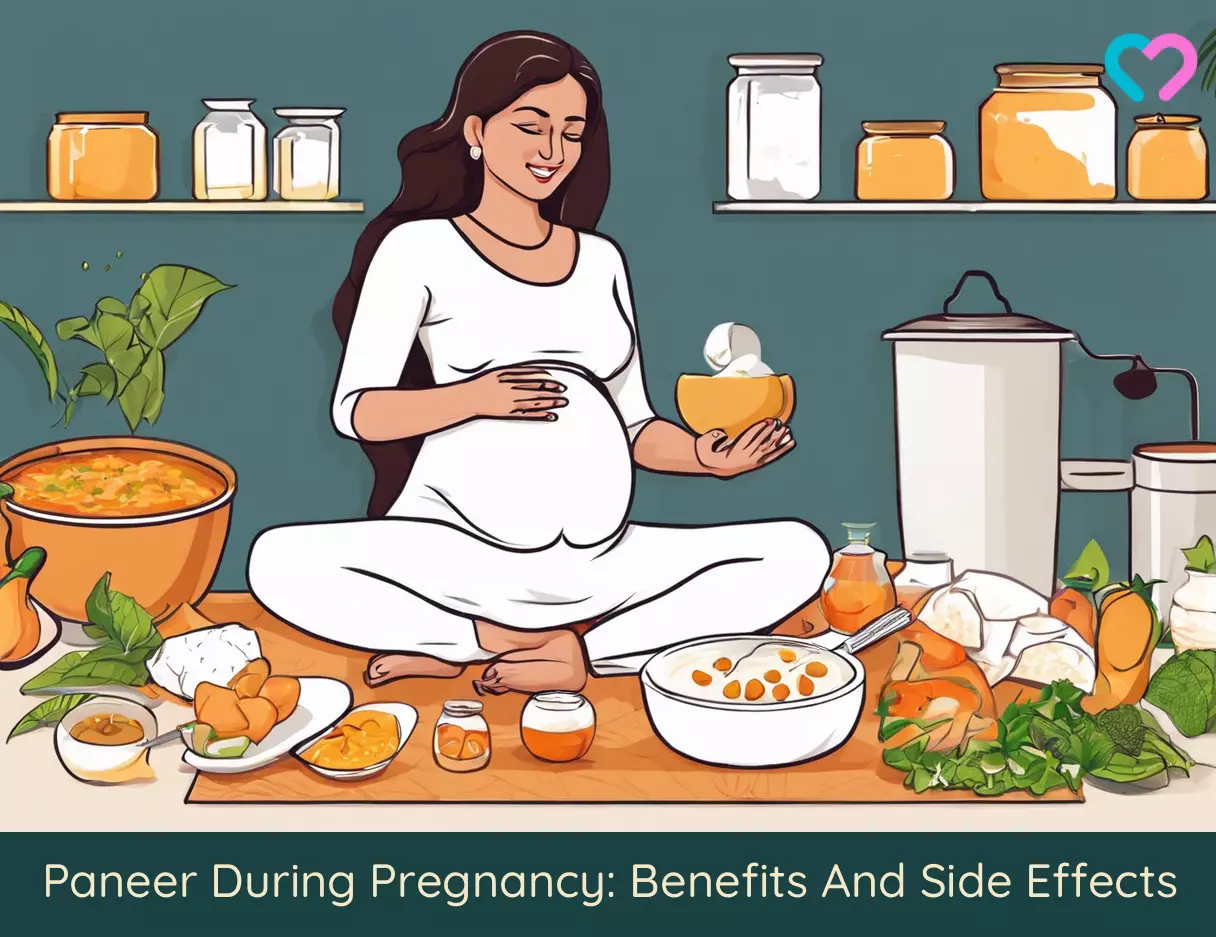
Image: Stable Diffusion/MomJunction Design Team
Personal Experience: Source
MomJunction articles include first-hand experiences to provide you with better insights through real-life narratives. Here are the sources of personal accounts referenced in this article.
i. Positive birth thoughts.https://ittosjournal.wordpress.com/category/pregnancy-and-baby-news/page/2/
References
- Sunil Kumar et al.; (2014); Paneer—An Indian soft cheese variant: a review.
https://www.ncbi.nlm.nih.gov/pmc/articles/PMC4008736/ - What exactly is cheese?
https://askdruniverse.wsu.edu/2016/07/31/cheese-what-exactly-is-it/ - Paneer.
http://www.ruf.rice.edu/~veggie/recipes/paneer.html - Shahnawaz Umer Khan and Mohammad Ashraf Pal; (2011); Paneer production: A review.
https://www.ncbi.nlm.nih.gov/pmc/articles/PMC3551056/ - Pregnancy: Nutrition;
https://health.clevelandclinic.org/pregnancy-diet
Community Experiences
Join the conversation and become a part of our nurturing community! Share your stories, experiences, and insights to connect with fellow parents.
Read full bio of Jyoti Benjamin
- Vivian Yu is a Melbourne-based dietitian nutritionist and the co-founder of Gym Near Me and One Body Personal Training. She did her graduation and post-graduation in nutrition and dietetics from Monash University and has more than six years experience in the field.
 Vivian Yu is a Melbourne-based dietitian nutritionist and the co-founder of Gym Near Me and One Body Personal Training. She did her graduation and post-graduation in nutrition and dietetics from Monash University and has more than six years experience in the field.
Vivian Yu is a Melbourne-based dietitian nutritionist and the co-founder of Gym Near Me and One Body Personal Training. She did her graduation and post-graduation in nutrition and dietetics from Monash University and has more than six years experience in the field.
Read full bio of Swati Patwal
Read full bio of Rebecca Malachi
Read full bio of Aneesha Amonz






